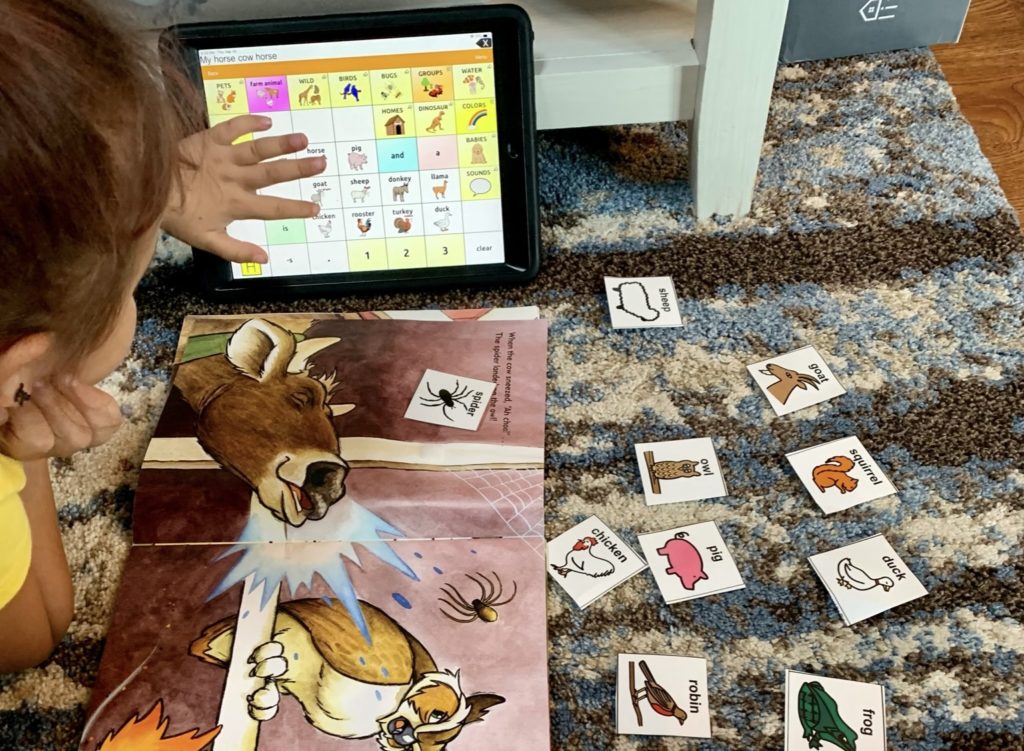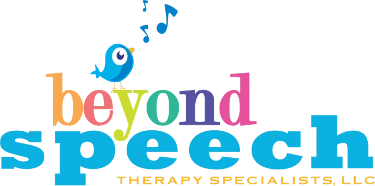And Why Would My Child Need It?
As parents, we strive to provide our children with the tools they need to communicate and express themselves effectively. But what if your child faces challenges that make traditional speech difficult or impossible? That’s where Augmentative & Alternative Communication comes into play.
In this blog post, we’ll delve into the world of AAC, answering your questions and exploring the reasons why your child may benefit from it.
At Beyond Speech Therapy Specialists, we understand the importance of effective communication, and AAC is a valuable resource that can open doors for your child.

Understanding Augmentative & Alternative Communication
Augmentative and Alternative Communication, commonly known as AAC, refers to a set of tools and strategies that support or replace spoken communication.
AAC encompasses a wide range of methods, from low-tech solutions like picture boards and communication books to high-tech devices with voice output capabilities.
The primary goal of AAC is to ensure that individuals with communication challenges can express themselves, make choices and participate fully in their day-to-day lives.
Why Would My Child Need AAC?
Augmentative & Alternative Communication is not limited to a particular age group or condition; it can benefit individuals across the lifespan who face various communication challenges.
Here are some common reasons why your child may benefit:
1. Speech and Language Delays:
Some children experience delays in speech and language development, which can impact their ability to express their needs, thoughts, and emotions effectively. AAC can provide them with an easily accessible means of communication while their speech continues to develop.
2. Speech Disorders:
Children with speech disorders, such as apraxia or dysarthria, may find it difficult to articulate words clearly. Augmentative & Alternative Communication devices can help bridge the gap between their intentions and their ability to speak.
3. Autism Spectrum Disorder (ASD):
Many children with ASD have unique communication profiles. Some may have limited speech, while others may struggle with social communication. AAC can support them in developing their communication skills while also connecting with others and building social skills.
4. Cerebral Palsy (CP):
CP can affect motor control and coordination, making it challenging for some children to produce clear speech. AAC can offer them an alternative means of communication that is less physically demanding.
5. Traumatic Brain Injury (TBI):
Children who have experienced a TBI may face temporary or permanent communication difficulties. AAC can provide a way for them to express themselves during their recovery process.
Signs Your Child May Benefit from Augmentative & Alternative Communication
Recognizing when your child may benefit from AAC is the first step to getting them the support they need.
Here are some signs to look out for:
- Limited or absent speech development, despite age-appropriate milestones.
- Frustration or meltdowns due to communication challenges.
- Difficulty making their needs, wants, and emotions known.
- Limited social interactions or difficulty maintaining conversations.
- A speech disorder diagnosis or a medical condition affecting speech and language.
Embracing AAC as a Supportive Tool
It’s essential to understand that Augmentative & Alternative Communication is not a replacement for speech – rather, it is a valuable support tool that complements speech development and enables effective communication.
AAC devices and strategies allow children to participate in various activities, express their desires and build meaningful connections with others – and feel confident doing it.

If you suspect that your child could benefit from AAC, your first step is to connect with a speech-language pathologist or specialist. These professionals can assess your child’s communication needs, recommend appropriate AAC solutions and provide training and support to ensure successful AAC implementation.
At Beyond Speech Therapy Specialists, we believe that every child deserves the opportunity to communicate and express themselves effectively. Augmentative and Alternative Communication is a powerful tool that can help children overcome communication challenges and unlock their full potential.
If you have questions or concerns about AAC or your child’s communication development, don’t hesitate to reach out to our team of expert speech-language pathologists!
We’re here to provide support, guidance, and resources to help your child thrive. Together, we can ensure that your child’s voice is heard and understood, fostering a world where communication knows no bounds.
You can reach us at (779) 435 – 0742 or click here to send us an email.

